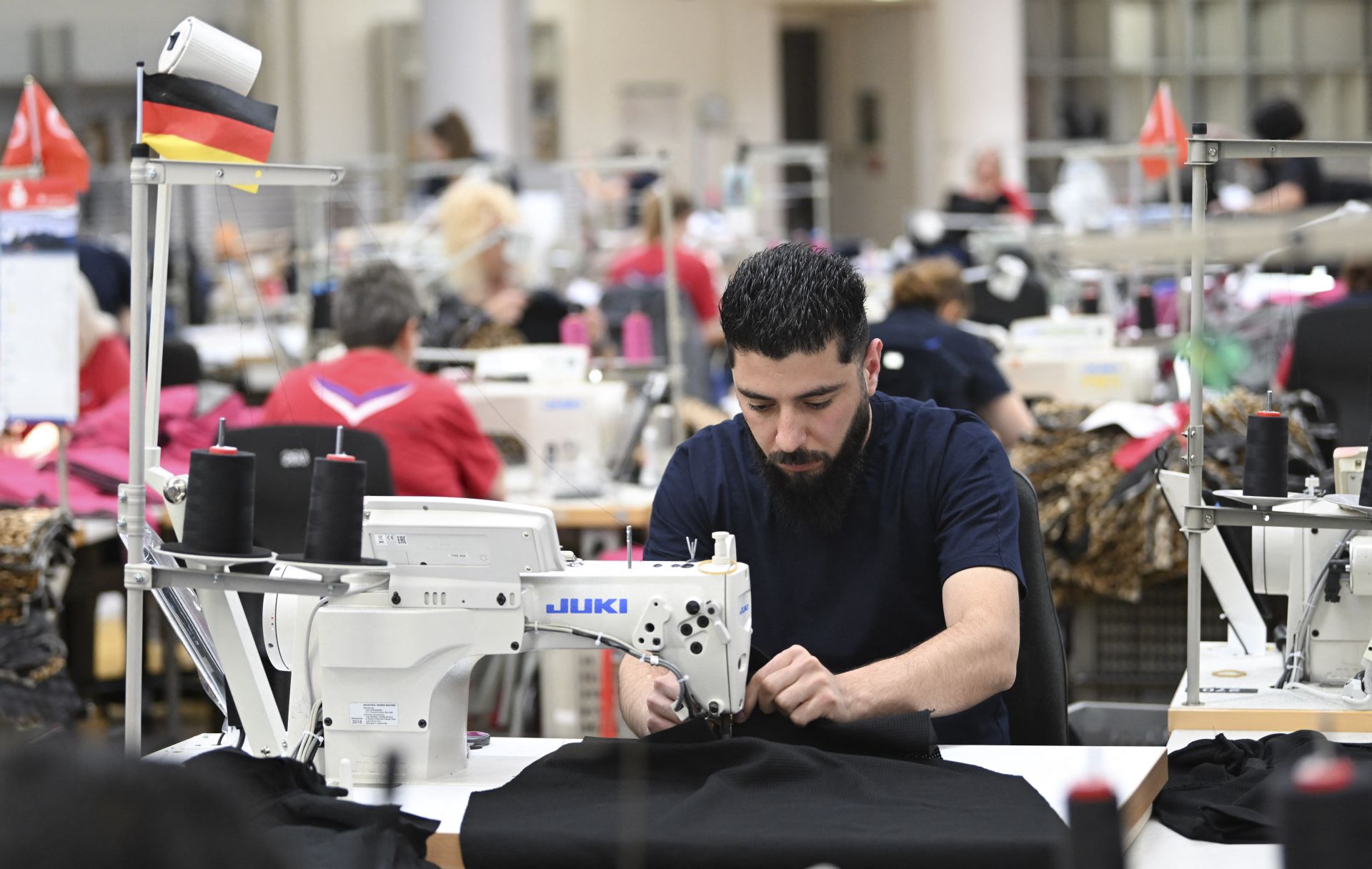- Home
- Middle East
- Hope and Hate: How Migrant Influx has Changed Germany

Mustafa Habash, a taylor from Syria, works in the sewing room at the headquarters of German textile manufacturer Trigema in Burladingen, southern Germany, on July 16, 2025. ©THOMAS KIENZLE / AFP
Men sit outside shisha bars and women in hijabs push strollers past Middle Eastern restaurants and pastry shops in Berlin's Sonnenallee, a wide avenue which has become a symbol of how much Germany has changed in the last decade.
Many came during the huge migrant influx of 2015, when a million people arrived in a matter of months -- mostly from Syria, Afghanistan and Iraq.
For barber Moustafa Mohmmad, 26, who fled the ruins of Syria's Aleppo, it is a home from home, "a kind of Arab street" where he can find sweets from Damascus and Aleppo-style barbecue.
To others it is a byword for integration gone wrong and disorienting change that has divided the country and helped make the far-right Alternative for Germany (AfD) the second biggest party.
"We can do this," Angela Merkel famously declared on August 31, 2015 as columns of desperate people walked through the Balkans towards Germany.
Civil wars were raging in Syria and Afghanistan, driving the largest wave of refugees since World War II, with the Mediterranean Sea becoming a mass grave.
Immigration crackdown
Ten years on, many bitterly complain that services, from childcare to housing, have been stretched to breaking point.
Others point to the many migrant success stories, the joys of a more cosmopolitan country, and newcomers plugging gaps in the ageing labour market.
But the country's current leader, Friedrich Merz, is not convinced and has lost little time undoing Merkel's legacy since coming to power in May.
His coalition government has cracked down hard with stricter border controls, tougher residency and citizenship rules and even deported migrants to Taliban-ruled Afghanistan.
Merz insists that strong measures are needed to halt the rise of the AfD and soothe fears inflamed by stabbings and car-ramming attacks blamed on migrants.
'I feel part of community'
Even to virulent critics of immigration, Syrian restaurateur Malakeh Jazmati, 38, ticks most integration boxes.
She came to Berlin in 2015 and quickly started a catering business with her husband. Two years later she was serving food to Merkel.
In 2018 she opened the Malakeh restaurant, among the most beloved of Berlin's new Syrian eateries.
"The German people are open to trying something new," she said, preparing batata harra, a potato appetiser scattered with pomegranate seeds.
Jazmati said her life in Germany is "full of challenges... but also full of happiness.
"It's not easy to live outside your homeland."
While her two German-born sons, aged two and nine, speak German and Arabic, her own attempts to learn the language have been thwarted by her workload and the fact that English is so widely spoken in Berlin.
But Jazmati believes integration also means feeling "part of the community. I have German friends. I pay my taxes. I try to speak German. And I also try a lot of German food," she said with a smile.
Finding work
Germany is now home to more than 25 million people with a "migration background", meaning either they or their parents were born abroad -- some 30 percent of the population. That includes more than a million with Syrian roots.
Arabic words like "yalla" (hurry up) and "habibi" (my love) have entered the vocabulary, particularly among the young.
Middle East culture from rap to theatre is also thriving, with some artists relishing the liberties of cosmopolitan Berlin.
Syrian belly dancer The Darvish whipped up the crowd in a gold-tasselled skirt and a red fez at a recent show in the Kreuzberg area.
The dancer -- a figure in the capital's LGBTQ community -- came in the 2015 wave, identifies as non-binary, and wants to connect "Arab and queer culture".
For most Syrians work is more humdrum, with the majority working low-paid jobs in the service, construction and health sectors.
Bonita Grupp has hired almost 70 migrants in her Trigema textile factory in the southern town of Burladingen, offering them housing, German lessons and training.
"Germans simply don't apply for these positions anymore," she said.
Resentment over benefits
Europe's biggest economy will need migrants more than ever in the years to come, with the German Economic Institute predicting a shortfall of around 768,000 skilled workers in the next two years.
Foreigners already account for 15 percent of healthcare professionals, according to the DKG hospital federation, with the largest number coming from Syria.
When right-wing politicians called for Syrians to go home when Bashar al-Assad's regime fell in December, the alarmed healthcare sector warned it couldn't do without its 5,000 or so Syrian doctors.
At one hospital in Quedlinburg in the central Harz mountains, 37 of the 100 doctors are migrants.
"Without our foreign colleagues, we would no longer be able to function," said Matthias Voth, director of the Harzklinikum Dorothea Christiane Erxleben.
Nearly two thirds of refugees who came in the 2015 wave had jobs by 2022, according to the latest data from the Institute for Employment Research (IAB).
But many migrants have yet to find work. They are four times more likely to be jobless than the rest of the population, with an unemployment rate of 28 percent last year.
Around 44 percent receive social benefits, according to the Federal Employment Agency -- a key vector fuelling resentment.
With AFP
Read more



Comments